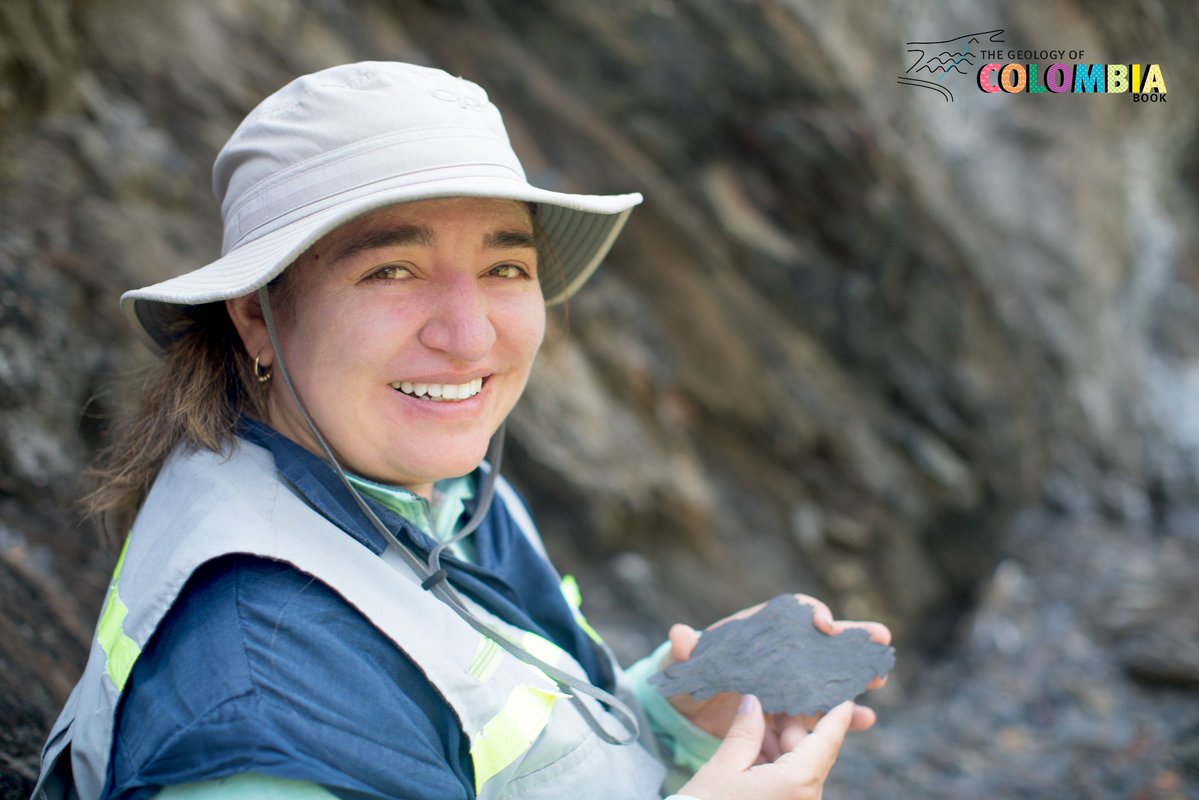
Marcela Gomez speaks about her research into fossils and about her role as director of the museum of the Colombian Geological Survey.
Cambridge is not just about acquiring knowledge. It is about being critical, rigorous and thorough and about asking the questions that move things forward.
Marcela Gomez
When she was a teenager, Marcela Gomez went to a book fair in Bogota with her father and sister. Her father, a chemistry professor, needed to buy some books for his class so took his daughters to the science section where Marcela found a book on stratigraphy, a branch of geology concerned with the study of rock layers and layering. “It caught my attention,” she says. “It was about how life left a print on rocks and how somehow you can read the earth like a book. It inspired me to want to study and understand the Earth.”
Decades later, she is now adviser to the General Director of the Colombian Geological Survey, helping to implement new legislation on the country’s fossil heritage.
Marcela [2004], who did a PhD in Earth Sciences at the University of Cambridge, studying a fossil which she had brought to the UK from Colombia, has one foot in the world of public policy and the other in research.
Her new role involves giving advice on how to protect Colombian heritage. She is also involved in UNESCO groups on world heritage and on the prevention of illicit trafficking of heritage. She says: “Fossils are now viewed as part of our heritage and not just scientific objects. They have a cultural meaning. This is a new page for me in the study of fossils.”
Childhood and undergraduate studies
Marcela was born in Bogota. Both her parents were professors of chemistry and she attended a private school. She studied the violin at a national conservatoire from the age of four until the end of high school. That made for an intensive week. School ran from 7am to 4.30pm and then Marcela had music classes until 7pm. She also had school on a Saturday until midday and in the afternoon would go to concerts. She also performed regularly as a member of the orchestra and choir.
However, she never saw herself as a professional musician and was always more interested in science. Her family, unlike many in Colombia, was not religious and therefore an interest in how life evolved and in the history of the earth was natural.
Marcela opted to do a degree in Geology at the Universidad Nacional de Colombia when she left school. Towards the end of her five-year degree, she studied palaeontology – the way life is preserved in rocks and how rocks could be used to understand life in ancient environments. She did her undergraduate dissertation on palaeontology in the region of Villa de Leyva north of Bogota, a region where she continues her fieldwork to this day.
After finishing her degree, she knew that she wanted to continue with her studies. Just as she was graduating, Marcela attended a palaeontology conference being held at the University of Cambridge’s Department of Earth Sciences. There she met Dr David Norman, who was to become her supervisor. She mentioned that she wanted to do a PhD and was encouraged to apply to Cambridge. After an interview, she was told that she could do the PhD if she passed an English exam. She applied for the Gates Cambridge Scholarship and recalls spending weeks on the application. When she heard about the result, she had already started classes in Germany after being given a DAAD scholarship to attend a university there.
Fossil study
For her PhD at Cambridge Marcela focused on a fossil which she had come across in the Universidad Nacional de Colombia – she later named it Acostasaurus pavachoquensis. The fossil is named after a Colombian priest, the father of palaeontology in Colombia, who discovered it in the 1960s and gave it to the university. It lay abandoned in the university for decades until it was recently studied and found to have characteristics which differ from other similar fossils.
Marcela had been fascinated by the fossil as an undergraduate as it came from the region she was studying. She brought the fossil with her to the UK to study and did a CT scan of it, creating digital models of the internal parts of the animal – a marine reptile from the Mesozoic era. The creature lived at the same time as the dinosaurs, but was not a dinosaur. Its body was three metres long and its head one metre in length. Other similar animals have been found in Colombia which are larger.
Marcela finished her PhD in 2008, but did not get receive her doctorate until the following year. At Cambridge she met her husband, who is a British palaeontologist and she took a job at CASP, a not-for-profit geological research organisation affiliated to the Department of Earth Sciences. She stayed there for a few years, working on the Siberia Project Project.
Marcela became pregnant in 2010 and the family moved to Colombia in 2012 where her husband got a job in a private university. Marcela worked for a time in an oil and gas company, but resigned after a year. Soon after, she got a job teaching at the same university as her husband and, after two years there, she was appointed director of the museum of the Colombian Geological Survey in Bogota.
Fossil heritage
She has now been in the job for around three years and has been able to continue her research and be involved in policy issues, including a campaign to get a law passed to protect Colombia’s geological and palaeontological heritage.
The president approved the law in July. It includes regulations on excavation and fossils. “In the past anyone could excavate, and take away, what they found,” said Marcela. “It was a hole in the law, but now we have some rules, for instance, fossils cannot be taken outside the country and people cannot come and excavate without permission. It also means we know more about who is doing research, what the research is and we know where the fossils are.”
Alongside the new law, Marcela says there needs to be an education campaign, which she hopes, will help to encourage more people to study palaeontology. As part civil servant, part researcher, she is also involved in engaging with the public about palaeontology.
Marcela says her experience at Cambridge, including the Gates Cambridge Scholarship, has stood her in good stead in her new role. “People talk a lot about future leaders, but it is a bit abstract and you don’t know how you will get there as a student. However, being in a place where you are taught to work hard, check your work is rigorous and to argue confidently is critical to becoming a leader in later life. I got to the position I am in because I am able to think critically and give my opinion.”
She adds: “Cambridge is not just about acquiring knowledge. It is about being critical, rigorous and thorough and about asking the questions that move things forward.”
*Picture credit: Alejandra Cardona of the Colombian Geological Survey

Marcela Gomez-Perez
- Alumni
- Colombia
- 2004 PhD Earth Sciences
- Newnham College












